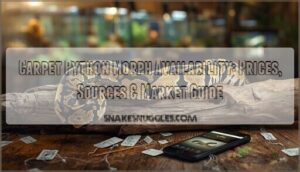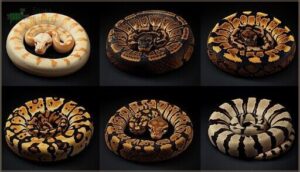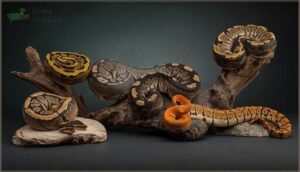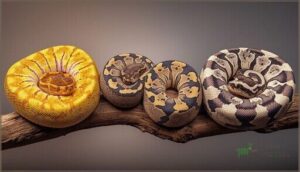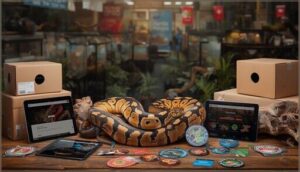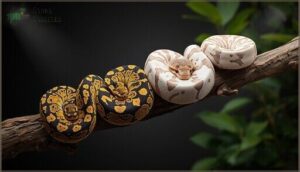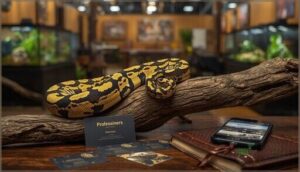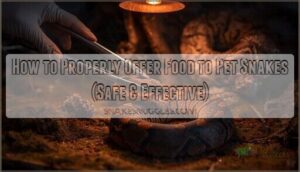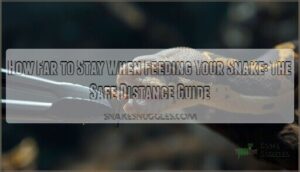This site is supported by our readers. We may earn a commission, at no cost to you, if you purchase through links.
The carpet python morph market explodes with new genetic combinations every breeding season, yet tracking down specific morphs requires traversing fragmented inventory across dozens of breeders, expo circuits, and online platforms. Albino, axanthic, and jaguar morphs dominate availability lists, but designer combinations carrying multiple traits—hypo granite tigers, caramel jaguars—vanish within hours of listing at premium prices.
Seasonal hatching cycles create predictable inventory surges between October and February, while scarcity during spring and summer drives competitive bidding on holdback animals and proven breeders. Understanding which platforms stock your target genetics, how regional laws shape access, and what price points separate fair deals from inflated hype gives you the leverage to secure quality animals before they’re claimed by faster-moving competitors.
Table Of Contents
- Key Takeaways
- Most Popular Carpet Python Morphs
- Current Carpet Python Morph Availability
- Regional Differences in Morph Access
- Pricing and Value of Carpet Python Morphs
- Where to Buy Carpet Python Morphs
- Frequently Asked Questions (FAQs)
- Which ball python morph is most popular?
- What time of year do carpet pythons breed?
- What are the different carpet python morphs?
- What shipping methods work best for morphs?
- How long do carpet python eggs incubate?
- Which morphs have highest breeding success rates?
- What permits are needed for interstate transport?
- Do carpet python morphs have different lifespans?
- How do I verify carpet python lineage documentation?
- Can carpet python morphs be shipped internationally?
- Conclusion
Key Takeaways
- You’ll secure the best carpet python morphs by tracking seasonal hatching surges between October and February, when albino, axanthic, and jaguar genetics flood online platforms before premium designer combinations sell out within hours at four-figure price points.
- Designer morphs stacking multiple traits—hypo granite tigers, caramel jaguars, albino zebras—command the highest prices and represent cutting-edge genetics, while pure locality types like Jungle and Diamond maintain value through documented lineage and regional authenticity.
- MorphMarket dominates availability with 300+ live listings filtered by morph type and genetics, but reptile expos deliver hands-on inspection advantages that let you verify pattern clarity and temperament before committing to purchases.
- Your access to specific morphs depends heavily on regional regulations, with CITES documentation, state-level constrictor restrictions, and international shipping logistics creating fragmented markets that reward buyers who understand legal frameworks and maintain direct breeder connections.
Most Popular Carpet Python Morphs
You’ll find carpet python morphs fall into three main categories that drive most of the market activity and breeder focus. Single-trait morphs like albino, axanthic, caramel, granite, jaguar, and zebra form the foundation of nearly every breeding project.
While pure locality types remain essential for enthusiasts tracking specific Australian bloodlines, designer combinations, produced by stacking multiple genetic traits into a single animal, command the highest prices and represent the cutting edge of what’s currently available.
Breeders often layer complementary genes to create stunning types of boa snakes that showcase both vibrant pigmentation and unique pattern expressions.
Albino, Axanthic, Caramel, Granite, Jaguar, and Zebra Morphs
You’ll find six foundational carpet python morphs dominating today’s market: Albino produces bright yellow-white animals with red eyes through recessive melanin removal, Axanthic strips yellow pigment to create high-contrast black-and-silver specimens, Caramel adds rich bronze tones via incomplete dominance, Granite pixelates normal banding into speckled rosettes, Jaguar delivers chaotic broken patterns with associated neurological wobble, and Zebra replaces bands with jagged striping through incomplete dominant inheritance.
Each morph can combine with others to create complex designer animals, and understanding how pattern variations interact with color genetics helps breeders predict offspring outcomes more accurately.
For a deeper exploration of morph genetics and variation, the Carpet Pythons resource details the key differences among these types.
Pure Wild Types and Locality Morphs
Beyond designer genetics, pure wild type Carpet Python specimens and locality morphs—Jungle from Julatten, Coastal, Irian Jaya (Morelia Spilota harrisoni), Diamond, and Darwin—deliver geographic variations with documented lineage that serious breeders value for morph preservation and breeding strategies rooted in locality genetics.
You’ll pay premium prices for animals showing authentic wild type traits traceable to founding stock, particularly line-bred Jungle and Diamond Python Morphs that maintain regional identity without designer crossbreeding.
For more information on essential housing setup and care, refer to this detailed guide on enclosure and lighting requirements.
Designer and Combination Morphs
Designer morphs stack multiple alleles—albino zebra, caramel jaguar, axanthic granite—to produce carpet python morphs that exceed single-gene color mutations in visual impact, rarity, and pricing structure. You’re targeting python genetics that merge pattern remix traits with hybrid coats, generating multi-gene complexes that shift hues from amber to lavender and remap dorsal geometry across successive molts.
Designer morphs combine multiple genetic traits to create carpet pythons with visual impact, rarity, and pricing far beyond single-gene mutations
- Color shift combinations create lime yellows and deep violets not seen in basic snake morphs and colors.
- Pattern remix morphs deliver mosaic or reticulated belly patterns stabilized over multiple clutches.
- Multi gene complexes involve three or more alleles, achieving composite looks with premium market pricing.
Current Carpet Python Morph Availability
You won’t have to hunt long to find carpet python morphs for sale—the market’s active, diverse, and easier to navigate than most reptile categories.
Major online platforms, regional expos, and specialty stores all carry different inventory pools, each shaped by breeder production cycles and seasonal demand shifts. Understanding where stock appears, when it peaks, and how listings fluctuate will give you a serious edge in securing exactly what you’re after.
Inventory on Major Online Marketplaces
You’ll gain serious morph availability when you tap into major online platforms built for reptile sales. MorphMarket dominates with over 300 carpet pythons live across the US and Canada at any moment, filtered by morph type, locality, and genetic traits. Fauna Classifieds pulls similar volume, while dedicated retailers stock multi-gene combinations alongside pure wild types.
Before buying, review ethical breeding practices and market sustainability concerns to understand the industry’s overproduction challenges.
Shipping policies vary, but most guarantee live arrival with overnight delivery and buyer protections covering health issues within three days of delivery.
| Platform Feature | Typical Offering |
|---|---|
| Active carpet python listings | 300–500+ animals (US/global combined) |
| Morph filter categories | Jaguar, Granite, Albino, Axanthic, locality types |
| Common shipping guarantee | Live arrival, 3-day health policy |
| Inventory turnover rate | Weekly restocks; frequent “out of stock” tags |
Availability at Reptile Expos and Specialty Stores
At reptile expos, you’ll handle jaguar, albinos, and coastal morphs directly from breeder tables, comparing pattern clarity and temperament before committing.
Large shows like Reptile Super Show and Daytona pull enough python vendors that carpet morphs appear across multiple booths, though specialty stores stock fewer specimens—usually one or two visually bold lines that move fast in their local markets, relying on pre-order catalogs for rarer combinations.
Seasonal Trends in Morph Listings
Most carpet python morphs flood online listings from late spring through mid-summer, driven by breeder strategies that time clutches around September–November egg-laying in captive cycles, delivering established feeders when shipping constraints ease and market fluctuations favor warm-weather transport.
Albino, Jaguar, and Granite hatchlings dominate inventory during this surge, while autumn sees discounted subadults and winter weather holds pause shipments below thirty-five degrees, creating predictable listing patterns reptile breeding enthusiasts exploit annually.
Regional Differences in Morph Access
Where you live directly impacts which carpet python morphs you can actually get your hands on, and at what price point.
The North American market operates under completely different conditions than Europe or other international regions, with shipping logistics, local breeding populations, and regulatory frameworks all shaping what’s realistically available to you.
Understanding these regional barriers and advantages helps you navigate the market strategically, whether you’re sourcing locally or arranging international transfers.
United States and Canada Market
You’ll find over 300 carpet python morphs actively listed across US and Canadian online sales platforms at any given time, with the United States dominating breeder networks and regional demand.
MorphMarket categories such as Jungle, Coastal, and Zebra facilitate your morph-specific searches, while border trade between both nations fosters thriving exchanges of designer genes—particularly high-end combinations that fuel exotic pet care markets and reptile breeding projects coast to coast.
Availability in Europe and International Markets
Across Europe and beyond, your access to carpet python morphs hinges on country-specific import fees, phyto-sanitary inspections, and European regulations that fragment breeder networks into isolated regional pockets.
Shipping logistics from North American or Australian sources stretch two to six weeks, while market trends reveal quarterly inventory cycles tied to major expos—currency fluctuations and wildlife conservation efforts further complicate international reptile breeding transactions within the exotic pet trade and reptile enthusiast community.
Legal and Regulatory Influences
You’ll navigate CITES regulations and permit requirements every time you move carpet python morphs across borders, since Appendix II listings demand export documentation and import restrictions tied to wildlife trade enforcement.
Animal welfare standards, municipal zoning codes, and state-level constrictor caps further dictate your breeding scale, while wildlife conservation efforts and exotic pet trade compliance programs push transparent origin records that protect reptile conservation and wildlife preservation efforts globally.
Pricing and Value of Carpet Python Morphs
You’re ready to pull the trigger on a carpet python morph, but the price tags can swing wildly depending on what you’re looking at.
A basic jungle might run you a couple hundred bucks, while a clean albino zebra combo can hit several thousand without breaking a sweat.
Let’s break down what actually drives these numbers so you know exactly what you’re paying for.
Average Prices by Morph Type
You’ll find albino carpet python morphs usually commanding $300–$900, while axanthic and caramel color genetics push values to $500–$1,500 and $400–$1,200 respectively.
Granite and jaguar snake morphs often occupy the $600–$1,800 band, influenced by breeding costs and market fluctuations.
Designer combinations featuring multiple color morphs routinely exceed $1,200, with triple-gene specimens reaching $3,500 when price variations reflect scarcity, lineage documentation, and morph price trends across current inventories.
Price Differences: Juveniles Vs. Adults
Juvenile carpet python snake morphs usually sell at 40–60% of adult pricing because size factors and growth rates require you to invest two to three years in reptile care and husbandry before breeding readiness arrives. Adult females in sought-after snake genetics and color morphs—proven producers with documented clutches—command low four-figure prices, reflecting breeding costs, feeder expenditures, and immediate morph value for serious carpet python breeding projects.
- Adult females multiply your investment by delivering clutches immediately rather than forcing you to wait through years of growth
- Juvenile pricing trades lower entry cost for ongoing feeder bills and enclosure upgrades as your snake matures to breeding size
- Proven adults eliminate color uncertainty since their final pattern and contrast are visible, removing the gamble inherent in hatchling purchases
Factors Affecting Morph Pricing
Morph rarity drives your pricing first—newly established jaguar combinations and Papuan axanthics hold four-figure tags while common jungle lines flood the market at hundreds.
Genetic influence stacks value when you combine hypo, tiger, and jaguar traits, breeder reputation adds premium charges for documented lineages, and visual quality separates crisp high-contrast animals from muddier clutchmates even when snake genetics match exactly.
Where to Buy Carpet Python Morphs
You can’t build a serious morph collection without knowing where the best animals actually come from, and that means connecting with the right breeders, platforms, and events that consistently deliver quality genetics.
Whether you’re hunting down a specific locale or stacking traits for a designer project, your sourcing strategy will make or break your investment.
Here’s where you should be looking to acquire healthy, documented carpet python morphs that meet your breeding goals.
Reputable Breeders and Online Sources
You deserve sellers who prove their stock—don’t settle for mystery genetics or sketchy photos. Major online marketplaces display seller ratings, buyer reviews, and documented health checks from licensed vets, giving you the Market Transparency and Buyer Protection serious Reptile Enthusiasts demand.
When Buying Carpet Pythons, prioritize Breeder Verification through:
- Published lineage information showing parent snakes and genetic percentages
- Health guarantees covering quarantine practices and parasite screenings
- Online Reviews from established reptile clubs verifying reputation
- Veterinary records confirming Snake Health before purchase
- Compliance certificates demonstrating legal Reptile Breeding and Genetics operations
In-Person Vs. Online Purchasing Options
You control the buying experience by choosing in-person or online channels, each route delivering distinct Buyer Protection and Shipping Risks. Reptile Expos and local sellers let you perform Snake Inspection, examining scale clarity, body condition, and feeding response before committing—Payment Security comes through immediate cash or card transactions with Purchase Guarantees you verify on-site.
Online platforms expand your Carpet Python options across continents, but buying Carpet Pythons remotely requires trusted sellers who mitigate Animal Sales and Marketing risks through temperature-controlled shipping, live arrival guarantees, and documented Pet Snake Ownership transfers that protect your investment.
Tips for Finding Healthy, Ethically Sourced Morphs
You secure quality Carpet Python Morphs by prioritizing Breeder Research—verify certifications, inspect facility cleanliness, and demand lineage documentation backed by Genetic Testing results.
Ethical Sourcing requires Health Guarantees with veterinary records, while thorough Snake Inspection reveals clear eyes, smooth skin, and proper body condition that distinguish healthy specimens from compromised stock in Snake Breeding and Reptile Care transactions.
Frequently Asked Questions (FAQs)
Which ball python morph is most popular?
You won’t find ball pythons in a carpet python article—wrong species entirely.
Albino, Mojave, and Pastel ball morphs dominate market demand based on color genetics, breeding trends, and consistent pet preferences.
What time of year do carpet pythons breed?
Carpet pythons usually breed in fall season when temperatures drop and photoperiod shortens, with ovulation occurring in late fall to winter, followed by egg laying in late winter or spring after breeding season completes.
What are the different carpet python morphs?
You’ll see albino, axanthic, caramel, granite, jaguar, and zebra genetic traits producing distinct color variations in Morelia spilota, plus designer combinations like albino jaguar blending multiple morphs into complex carpet pythons with enhanced snake variations and unique breeding techniques.
What shipping methods work best for morphs?
Think of overnight shipping as your morph’s safe passage through hostile territory—FedEx Priority Overnight or UPS Next Day Air keeps your carpet python morphs moving under 24 hours with temperature-controlled insulated packaging throughout transit.
How long do carpet python eggs incubate?
You’ll see incubation periods run 50 to 60 days at controlled egg temperature around 88 to 90°F, with humidity control near 100 percent ensuring predictable hatching times across breeding seasons in captive snake breeding and care.
Which morphs have highest breeding success rates?
Albino, axanthic, jaguar, zebra, and granite carpet python morphs demonstrate the highest breeding success, delivering healthy hatch rates, strong hatchling viability, and consistent clutch sizes.
When breeder protocols maintain ideal incubation tips and morph genetics management, these outcomes remain reliable.
What permits are needed for interstate transport?
Commercial reptile transport across state lines demands specific federal authorizations: USDOT numbers for interstate operations, MC carrier licensing for regulated wildlife, UCR registration annually, IFTA fuel tax reporting, and IRP decals coordinating multi-jurisdiction vehicle compliance.
Do carpet python morphs have different lifespans?
Morph genetics don’t directly determine lifespan factors in carpet pythons—proper husbandry, health monitoring, and environmental impact matter far more.
With ideal care, all morphs usually achieve similar longevity research outcomes spanning fifteen to twenty-five years.
How do I verify carpet python lineage documentation?
Your paperwork’s worth is in the breeder verification—verify through cross-referencing contact information, confirm pedigree research with pairing records.
Demand genetic testing or document authentication that shows true lineage records tracking carpet python morphs.
Can carpet python morphs be shipped internationally?
Yes, you can ship carpet python morphs internationally, but export regulations demand CITES documentation, veterinary care certificates, import permits, and quarantine procedures—all enforced to protect wildlife conservation and guarantee your reptile snake arrives legally and healthy.
Conclusion
Winning the race for elite genetics means knowing exactly where to look when your target animal drops. Carpet python morph availability shifts weekly across platforms, expo floors, and breeder holdback lists, rewarding those who track seasonal hatching cycles and maintain direct connections with trusted sources.
You’ve now got the intel to identify fair pricing, navigate regional access restrictions, and secure quality specimens before competitors claim them—turning knowledge into ownership when the right morph finally surfaces.
- https://reptilesmagazine.com/carpet-python-care-sheet/
- https://exoticskeeper.com/blog/much-morelia-than-meets-the-eye/
- https://www.morphmarket.com/us/c/reptiles/pythons/carpet-pythons
- https://www.carpetpythons.com/en/carpet-python-morphs
- https://www.scribd.com/document/740268456/Bethany-Fox-Hypopigmentation-and-Spider-Wobble-Composition-II-Science

